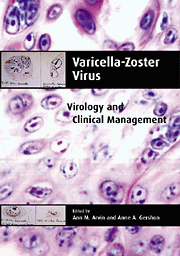Book contents
- Frontmatter
- Contents
- List of contributors
- Preface
- Introduction
- Part I History
- Part II Molecular Biology and Pathogenesis
- Part III Epidemiology and Clinical Manifestations
- Part IV Laboratory Diagnosis
- Part V Treatment and Prevention
- 18 Treatment of varicella
- 19 Treatment of herpes zoster
- 20 Management of postherpetic pain
- 21 Passive antibody prophylaxis
- 22 Development of the Oka vaccine
- 23 Primary immunization against varicella
- 24 Prevention of nosocomial transmission
- 25 Immunization against herpes zoster
- Index
- Plate section
18 - Treatment of varicella
from Part V - Treatment and Prevention
Published online by Cambridge University Press: 02 March 2010
- Frontmatter
- Contents
- List of contributors
- Preface
- Introduction
- Part I History
- Part II Molecular Biology and Pathogenesis
- Part III Epidemiology and Clinical Manifestations
- Part IV Laboratory Diagnosis
- Part V Treatment and Prevention
- 18 Treatment of varicella
- 19 Treatment of herpes zoster
- 20 Management of postherpetic pain
- 21 Passive antibody prophylaxis
- 22 Development of the Oka vaccine
- 23 Primary immunization against varicella
- 24 Prevention of nosocomial transmission
- 25 Immunization against herpes zoster
- Index
- Plate section
Summary
This chapter emphasizes the controlled clinical trials that support the use of antiviral interventions for the treatment of varicella. Since varicella represents a primary infection, with varicella-zoster virus (VZV), the viral load is high and there is a documented viremic phase. While varicella is usually a mild and self-limiting infection in the normal host, life-threatening disease can occur in the immunocompromised host.
Therapeutic agents
Antiviral therapy was first shown to be efficacious for the management of varicella in the late 1970s and early 1980s using the nonspecific inhibitors of viral replication, vidarabine and interferon. Acyclovir, which is a second generation, specific inhibitor of VZV replication was then proven useful and has become the drug of choice. The prodrugs of acyclovir (valaciclovir) and penciclovir (famciclovir) have been licensed for the treatment of herpes zoster; but data are not yet available to prove the efficacy of these drugs in the management of varicella. Additionally, foscarnet, a pyrophosphate analog, is available for intravenous therapy of varicella infections in high-risk immunocompromised hosts who are presumed to have an infection caused by an acyclovir or penciclovir resistant virus.
Acyclovir and valaciclovir
Acyclovir has become the most widely prescribed and clinically effective antiviral drug available to date for the management of herpesvirus infection. Valaciclovir, the l-valine ester oral prodrug of acyclovir (Valtrex®), was developed to improve the oral bioavailability of acyclovir.
Chemistry, mechanism of action and antiviral activity
Acyclovir (9-{2-hydroxyethoxymethyl}guanine) is a synthetic acyclic purine nucleoside analog that is a selective inhibitor of herpes simplex virus (HSV types 1 and 2) and VZV replication (Elion et al., 1977; Schaeffer et al., 1978).
- Type
- Chapter
- Information
- Varicella-Zoster VirusVirology and Clinical Management, pp. 385 - 395Publisher: Cambridge University PressPrint publication year: 2000
- 3
- Cited by

